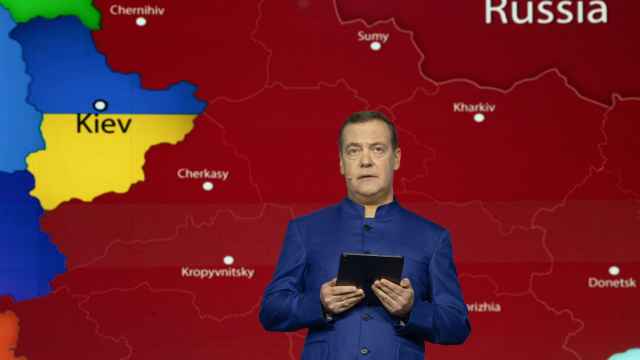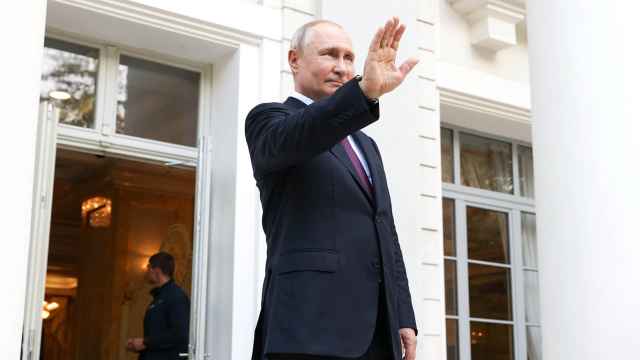 Alexei Bayer
Alexei BayerThe 1952 short story by U.S. science fiction writer Ray Bradbury "A Sound of Thunder" is about a hunting safari in a time machine, when hunters get to kill a dinosaur. The hunters are supposed to leave no trace of their presence in the past since the slightest interference with events would be magnified over the ensuing millennia. But during the hunt, one character strays from the carefully laid-out path, crushes an insect and thus irreparably alters the course of history.
Although this story was published in Russian in 1965 during the post-Stalinist liberal thaw, its publication was still a surprise because, deliberately or not, Bradbury had written a brilliant parable about the use of history in the Soviet Union.
The Bolsheviks used Karl Marx's analysis of history to legitimize their totalitarian regime and justify their radical social, economic and political reforms. They arranged history into a convenient pattern, explaining that the creation of the Communist state was an "objectively inevitable" part of historical development and human progress. They tossed aside all facts that didn't fit in and accused those who disagreed with them of being "falsifiers of history" and bourgeois agents.
This proprietary attitude gave Soviet leaders license to rewrite history at will — and keep doing so as often as they wanted. Constant corrections of the past were savagely satirized by George Orwell in his "1984" dystopian classic and documented in such later works as David King's "The Commissar Vanishes," featuring early Soviet photographs with purged leaders gradually retouched out.
For all of the Communists' obsession with claims to have the "only correct, scientific" analysis, they didn't know history. Their "new era" lasted only 82 years. But they used their artificial theories as a license to raze historic monuments, attack national traditions, customs, morality and beliefs and destroy social institutions. This all had disastrous consequences for Russia.
They also destroyed history, thrusting it into contemporary political discourse. Arguments about Russia's current political situation invariably feature arbitrary judgements not only of Nicholas II or Stalin, but also of such older rulers as Ivan the Terrible. Westernizing reforms by Peter the Great in the late 17th century and by Mikhail Gorbachev 200 years later are still debated with passion and urgency, as though they can still be reversed today.
In Russia, history remains a politicized "extreme science." At one end, there is the New Chronology, developed by mathematician Anatoly Fomenko, which puts historic events on their head and offers a schizophrenic alternative history. At the other, there is a bill in the State Duma that would forbid questioning the official Soviet version of World War II.
The saying "History is written by the winners" has been variously attributed to Napoleon and Winston Churchill. It should be added that losers don't write history, but instead they keep rewriting it all the time. They also obsessively reargue and relive historical events over and over again. William Faulkner, a writer from the defeated U.S. South, famously said: "The past is never dead. It's not even past." Many defeated nations similarly nurse their historic wounds.
Germany was defeated in World War II but won the peace, and it seems at ease with its troubled history. But Russia is still trying to shape its history to its liking. The actual history, meanwhile, is being destroyed — literally. Within a stone throw from the Kremlin, wrecking crews are now dismantling the historic Volkonsky family house, described by Leo Tolstoy in "War and Peace."
Alexei Bayer, a native Muscovite, is a New York-based economist.
A Message from The Moscow Times:
Dear readers,
We are facing unprecedented challenges. Russia's Prosecutor General's Office has designated The Moscow Times as an "undesirable" organization, criminalizing our work and putting our staff at risk of prosecution. This follows our earlier unjust labeling as a "foreign agent."
These actions are direct attempts to silence independent journalism in Russia. The authorities claim our work "discredits the decisions of the Russian leadership." We see things differently: we strive to provide accurate, unbiased reporting on Russia.
We, the journalists of The Moscow Times, refuse to be silenced. But to continue our work, we need your help.
Your support, no matter how small, makes a world of difference. If you can, please support us monthly starting from just $2. It's quick to set up, and every contribution makes a significant impact.
By supporting The Moscow Times, you're defending open, independent journalism in the face of repression. Thank you for standing with us.
Remind me later.





